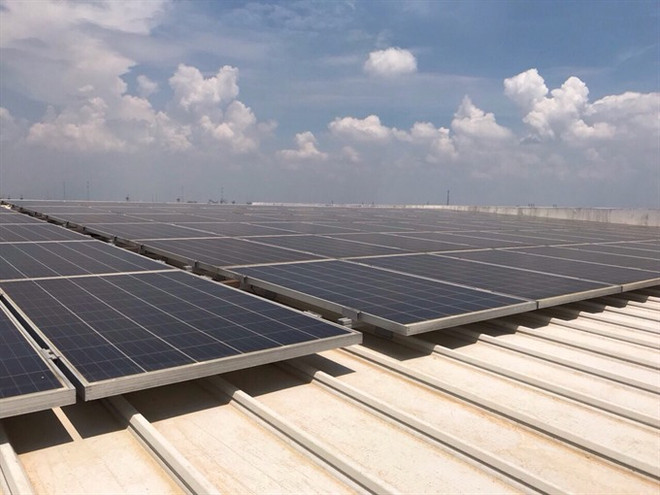 Solar power system of the German Factory DBW at the Long Hau IP in Long An province’s Can Giuoc district, the first ever green factory in Vietnam (Photo: VNA)
Solar power system of the German Factory DBW at the Long Hau IP in Long An province’s Can Giuoc district, the first ever green factory in Vietnam (Photo: VNA)Hanoi (VNA) - Rooftopsolar power in Vietnam could be smoothly integrated into the national grid,energy experts said at a seminar in Hanoi on October 12.
Co-organised by the EU EnergyInitiative Partnership Dialogue Facility (EUEI PDF) and the Ministry ofIndustry and Trade’s Electricity Regulatory Authority of Vietnam (ERAV), theseminar struck an optimistic tone on the future of solar energy in Vietnam.
Experts from an EU consultantsgroup shared the results of a four-month pilot project on rooftop solar powerin Da Nang city’s Hoa Cam industrial zone. Industrial parks are good places tobuild solar panels because they have large rooftops and strong electricalconnections already available.
“The cost of solar powerinstallation in Vietnam is lower than in countries such as the US,” ChadLaurent, expert of EUEI PDF’s consultants group said. “There are favourableconditions for businesses to invest in solar power.”
Speaking at the event, AlejandroMontalban, head of the Co-operation and Development Section of the EUDelegation to Vietnam, said, “We are glad that EUEI PDF has been able toprovide technical assistance, and to show that there is a high potential forthe integration of rooftop solar power production in Vietnam.”
Nguyen Quang Minh, deputychairman of ERAV, said it has taken steps to shape a policy for both smallrooftop solar power installations with a net-metering mechanism in householdsand for large rooftop installations at industrial parks.
The net-metering mechanism is asystem in which solar panels or other renewable energy generators are connectedto a public-utility power grid and surplus power is transferred onto the grid,allowing customers to offset the cost of power drawn from the utility.
[Solar power calculators set up to promote renewable energies]
“The development of solar powerin Vietnam is a hot issue,” Minh said. “And with regards to how to developsolar power in the country, where electricity plants can only provide powerwell from April to September, policy-makers are finding solutions suitable tothe growing desire to implement solar power.”
The Prime Minister’s Decision No11 issued in April 2017 and the Ministry of Industry and Trade’s Circular 16,set to take effect in late October 2017, provide specific steps to guidebusinesses to develop solar power projects, especially rooftop solarinstallation, Minh said.
A representative of aFinland-funded rooftop solar power project implemented in Hanoi agreed that Governmentpolicies have assisted businesses and individuals in building up and developingsolar power. But the representative said that inherent conflicts of interestbetween investors, household owners and the power companies are a problem.
According to the EU experts, theprice of the world’s solar power has been decreasing. Since 2010, the number ofsolar power projects in the world has doubled.
Vietnam has extensive resourcesto develop solar energy with technical potential estimated at 300 Gigawatt(GW). The Vietnamese Government has set ambitious targets to install 12GW ofsolar power by 2030.
“And we hope the net-meteringregulation will be completed as needed in the years to come, to support themarket development,” said Montalban.
Thursday’s workshop was thegroup’s second solar-power focused seminar after the first meeting in Junefocused on net-metering policies for solar power.-VNA





























